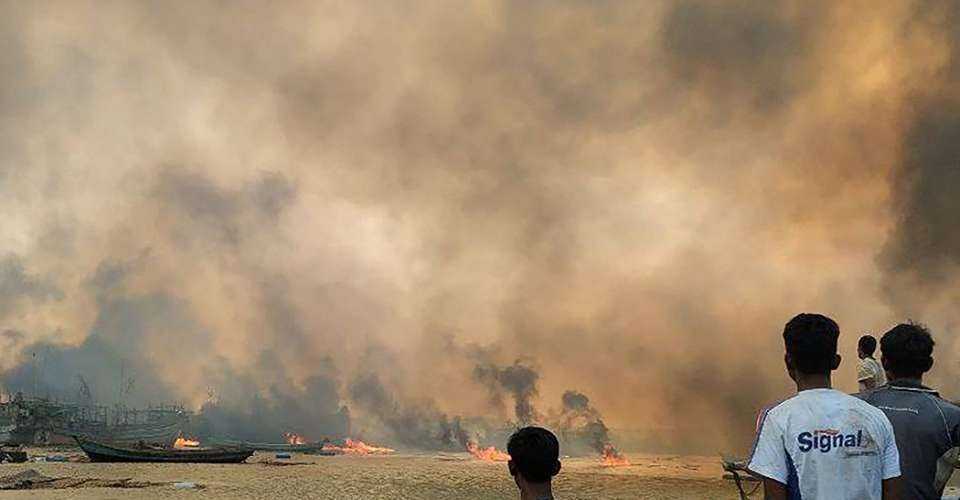
This photo taken and released on Jan 9 by the Arakan Army (AA) ethnic minority armed group shows people looking at burning homes following a suspected air strike carried out by Myanmar’s military at Kyauk Ni Maw village in Ramree island in western Rakhine state. The strike reportedly killed at least 40 people. (Photo: AFP/ ARAKAN ARMY)
After three years of failed diplomacy, the Association of South East Asian Nations (ASEAN) has upped the ante and warned the military junta in Myanmar to end the civil war and allow the free flow of much-needed humanitarian aid.
Under a new rotating chair, with Malaysia at the helm, ASEAN told the military at its weekend foreign ministers summit in Langkawi that its promised elections for later this year were not the priority after airstrikes left 40 people dead in western Rakhine state.
“Malaysia wants to know what Myanmar has in mind,” Malaysian Foreign Minister Mohamad Hasan said. “We said the election has to be inclusive. The election cannot be in isolation, it has to involve all stakeholders.”
“We told them the election is not our priority. Our priority is to stop the violence,” he said in what was perhaps the boldest statement from ASEAN since the junta ousted an elected government in early 2021 and tipped the country into a civil war.
ASEAN has split over the conflict with its five-point consensus for peace in tatters after previous chairs attempted direct negotiations with the military while, for the most part, ignoring the 20-odd Ethnic Armed Organizations (EAOs) and the exiled National Unity Government (NUG).
Thailand had urged ASEAN to establish a troika comprising this year’s chair Malaysia, last year’s chair Laos, and Indonesia who will host ASEAN in 2026, to handle negotiations as the junta suffered substantial territory losses to anti-regime forces throughout 2024.
Only China, which has substantial oil and gas assets in western Rakhine state, has held talks with the EAOs and has negotiated a truce between the military and the Myanmar National Democratic Alliance Army (MNDAA) which came into force on Jan. 18.
The MNDAA is largely made up of ethnic Chinese and controls a major military base near the Chinese border. It is also part of the Three Brotherhood Alliance, with the Ta’ang National Liberation Army (TNLA) and the Arakan Army (AA), which controls most of the border region.
Chinese foreign ministry spokesperson Mao Ning told a regular press briefing on Jan. 20 that a halt to fighting near the border of both countries was the priority and China would continue to actively promote peace and dialogue for the peace process in northern Myanmar.
“Cooling down the situation in the north of Myanmar is in the common interest of all parties in Myanmar and all countries in the region, and contributes to the security, stability, and development of the border areas between China and Myanmar,” she said.
Talks between China, the TNLA and the AA have also been ongoing, however, previously brokered ceasefires across the northern borderlands, the last in January 2024, were short-lived.
Anti-regime forces control most of the country with many analysts saying the military can only claim direct control over about 15 percent of Myanmar.
Importantly, for Beijing, is whether the junta or the EAOs are in control of its 771km oil and gas pipeline that stretches from the Indian Ocean and across Rakhine state into China.
source : ucanews
